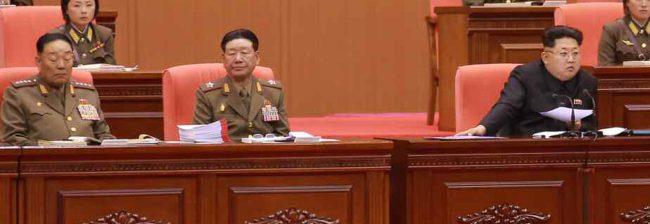North Korea executed its defense chief for treason late last month using an anti-aircraft machine gun, lawmakers said Wednesday, citing a National Intelligence Service briefing.
The killing of Hyon Yong-chol, minister of the People’s Armed Forces, took place around April 30 at the Kangkon Military Academy in Pyongyang with hundreds including his family in attendance, the agency told lawmakers at a closed-door parliamentary briefing.
He was charged with treason for dozing off while Kim was giving a speech at a military rally on April 24-25, “talking back” to the young ruler and failing to follow and complaining about his instructions, said Reps. Lee Cheol-woo and Shin Kyoung-min, members of the National Assembly’s intelligence committee, after the session.
The killing of Hyon Yong-chol, minister of the People’s Armed Forces, took place around April 30 at the Kangkon Military Academy in Pyongyang with hundreds including his family in attendance, the agency told lawmakers at a closed-door parliamentary briefing.
He was charged with treason for dozing off while Kim was giving a speech at a military rally on April 24-25, “talking back” to the young ruler and failing to follow and complaining about his instructions, said Reps. Lee Cheol-woo and Shin Kyoung-min, members of the National Assembly’s intelligence committee, after the session.

Hyon, who was promoted to the rank of vice marshal in 2012, is the latest victim in a string of slayings by Kim to cement his power, according to the NIS. The military leader appears to be the highest North Korean official to have been executed since Jang Song-thaek was killed in December 2013. Jang was Kim’s uncle and vice chairman of the powerful National Defense Commission, and was once dubbed the country’s second-most influential man.
“Unlike previous purges such as of Jang and former General Chief of Staff Ri Yong-ho, Hyon’s execution was swiftly carried out, within three days of his arrest, without the party politburo’s decision-making process or a trial,” the NIS said, adding that details of the reason behind the purge need further confirmation.
“Skepticism about Kim’s leadership is spreading among North Korean executives.”
But the agency dismissed as “groundless” a recent news report that Kim Kyong-hui, Jang’s widow, was poisoned to death a year ago. Speculation persists over her whereabouts, as she has made few public appearances since her husband’s death, and is thought to have been receiving treatment for an illness in Singapore and elsewhere.
Pyongyang has also killed other military and party aides over the past six months, the NIS noted, including Ma Won-chun, a senior NDC official; Gen. Pyon In-son, head of operations in the Korean People’s Army; and Han Kwang-sang, a director of the finance department at the ruling Korean Workers’ Party.
They are three of at least 15 senior officials who the agency said were executed this year, in addition to the confirmed 41 cases last year. The list includes a vice forestry minister accused of complaining about reforestation policy and four artists of the Unhasu orchestra, a top music company in the North, who were caught up in a sex scandal.
But Cheong Seong-chang, head of unification strategy research at the Sejong Institute, warned against a “hasty” assumption over any reshuffle in Pyongyang’s top echelon, stressing the need for further verifications of intelligence such as through state media and other methods.
“Hyon had appeared in documentary films about Kim Jong-un until two days ago, which is highly unlikely for a member of the North Korean elite who was purged more than 10 days before,” he said.
“He could have been sacked from his job and received severe penalties for lese majeste but what the NIS called a purge is different, meaning he was either sent to a concentration camp or executed. … The question should be how confident the agency’s announcement is and why it disclosed the unproved information now, instead of why Kim has removed him.”
By Shin Hyon-hee (heeshin@heraldcorp.com)









![[Hello India] Hyundai Motor vows to boost 'clean mobility' in India](http://res.heraldm.com/phpwas/restmb_idxmake.php?idx=644&simg=/content/image/2024/04/25/20240425050672_0.jpg&u=)









